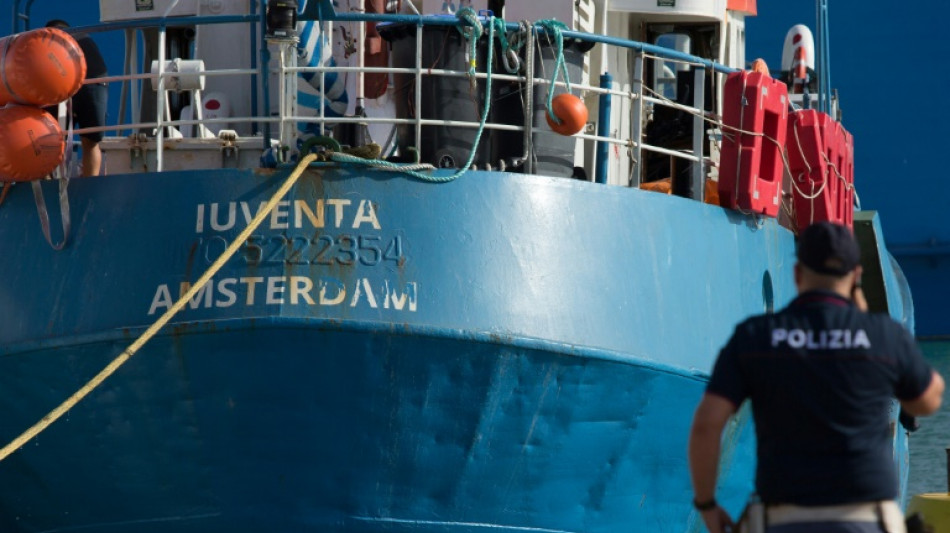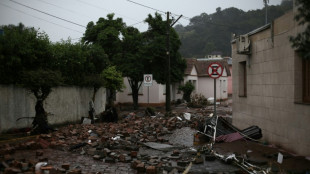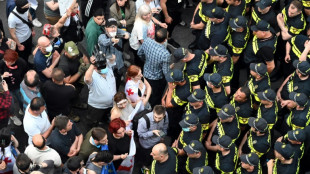

Migrant rescuers seek vindication after lengthy Italy case
After seven years of investigations, crew members from migrant rescue ships accused by Italy of helping human traffickers in the Mediterranean hope to finally clear their names Friday.
A Sicilian court is set to decide whether or not to proceed to trial in a case against staff from several charity ships, including the Iuventa operated by German NGO Jugend Rettet. Rights groups have slammed the case as politically motivated.
Triggered by a tip-off by an ex-policeman on board and marked by the wire-tapping of lawyers and journalists, the case has been highlighted as an extreme example of efforts by European governments to thwart NGOs helping migrants at sea.
But in a stunning development in February, prosecutors recommended that all charges be dismissed -- a decision the court in Trapani is expected to follow on Friday.
The lawyer for the Iuventa crew members, Francesca Cancellaro, said the seven-year investigation and preliminary hearings showed "how pervasive the effects of criminalisation of solidarity can be".
- Migrant surge -
Italian authorities began to focus in on the rescue workers in 2016, as Rome's then centre-left government grappled with a double-digit increase in the number of migrants reaching its shores.
About 181,000 migrants landed in Italy that year, as part of a wider surge that saw more than two million asylum-seekers enter the EU, many from war-torn Syria and Afghanistan.
A former policeman working as a security contractor on Save the Children's Vos Hestia ship first reported allegations that the charities were working with people traffickers.
Police placed an undercover agent on the ship, while investigators wire-tapped charity workers, lawyers and journalists -- a move that sparked outrage when it became public.
Charges were eventually brought in 2021 against 21 individuals from the Iuventa and from the Vos Hestia and Vos Prudence ships operated by Save the Children and Doctors Without Borders (MSF).
After the case was split into various separate proceedings last year, eight crew members and two ship captains remained as individual defendants in the case to be decided Friday.
Three entities -- Save the Children, MSF and the shipping company that owned two chartered vessels -- are similarly charged.
Accused of facilitating illegal immigration from Libya to Italy in 2016 and 2017, the defendants risked up to 20 years in prison.
They were accused of coordinating their search-and-rescue actions with human traffickers off Libya, returning dinghies and boats to them to be reused, and of rescuing migrants in the Mediterranean whose lives were not in danger.
The Iuventa ship itself, which was seized in 2017, remains "abandoned, plundered and largely demolished" at the port of Trapani, its operator has said, despite a December 2022 court ruling to return it to its original condition.
- 'Criminalisation' of rescue workers -
Amnesty International, Human Rights Watch and even the UN's Special Rapporteur on the situation of human rights defenders have all criticised Italy for its "criminalisation" of volunteer migrant rescue workers, and for due process violations against defendants.
When prosecutors recommended the case be dismissed, Iuventa's crew reported that government lawyers in court had "admitted that the main witnesses lack credibility and that there is no basis for any wrongdoing on the defendants' side".
But the tough stance against migrant rescue NGOs has accelerated under Prime Minister Giorgia Meloni's hard-right government, which accuses the ships of encouraging people traffickers.
Rome has limited ships to one sea rescue at a time, and forces them to dock at an assigned port -- rules the charities say has severely curtailed rescues.
The government has also renewed a controversial EU-endorsed deal between Italy and the UN-backed Libyan government in Tripoli signed in 2017.
Under that deal, Italy provides training and funding to the Libyan coastguard to stem departures of migrants and fight traffickers.
D.Walsh--MC-UK




